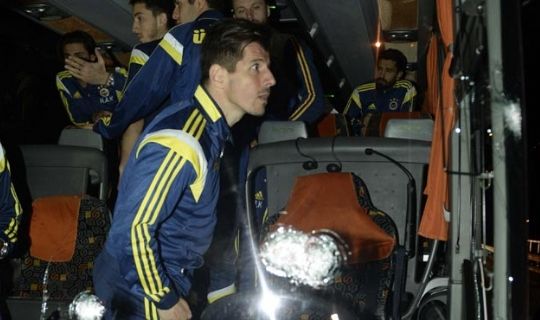
Never again!
The ambush on the Fenerbahçe team will cause anger for a few more days and then will be forgotten. However, if the ambush had proven successful and a team of young sportsmen worth 116 million Euros had been wiped out before our eyes, this would have been a moment remembered in history. It would have affected the future in Turkey, as a stain on football and all sports in general.
My question is this: Is the occurrence of a great disaster really necessary, before people are compelled to say “never again!”? In reality, every day terrible scenarios are playing out one after another. If great losses are not caused as a result, they lose their effect and are forgotten. Particularly, incidents that do not directly affect are forgotten even quicker. What is more, there are those who are oddly upset or regretful that this disaster has not occurred. Everybody is watching. Some regret that the disaster did not occur; others are only sensitive to the degree that their three minute attention span allows them to be.
I found the name of one of the ongoing exhibitions at the Holocaust Museum in Washington DC very striking: “Some Were Neighbours”. The subject of the exhibition was the ordinary people who watched as their neighbours were taken from right next to them during the Holocaust. Those who witnessed everything. Those who fussed so that the flames did not spread to their own stores during the looting. Those who took or sold the silver and linen from the homes of their Jewish neighbours who were being taken away. All of Europe was not cleansed by the SS. German officers did not even set foot in some areas. Sadly the Nazis found willing volunteers in many areas. Some had been brainwashed. For example, the Poles enthusiastically helped the Germans with the forced transporting as they wished to be protected from Russian invasion. Some thought it reasonable to allow the population to decrease in order to cope with poverty. Some just watched without thinking of anything. However, as said by J. Stuart Mill, inaction is also sometimes a way to harm others. Most people remained inactive, either due to fear, greed or not knowing what to do when faced with a moral test.
The thing that people have vowed will happen “never again” is actually relived everyday on every corner. The reasons why it does not hold historic significance is that it is either covered up, or its results are not as tragic as planned or that people do not care about it due to their own gain. Being a spectator continues, until the moment that something happens that is destructive enough to say “never again”.
Winston Churchill stated that, history is written by the victors. Had World War I been won by the Central Powers, today we would be talking about different historical facts. Likewise, had the assassination of Julius Caesar failed and Caesar remained in power, we would be experiencing the reflection of a stronger Roman Empire in our modern day. Foucault made a determination: The victors in society write history using their political force and repress the historical facts that would probably be featured in the version of those who have been defeated. They may also attempt historical revisionism (God forbid!).
In short, what I want to say is that history is a hand crafted product. Its results can be reflected in a biased manner. For this reason we should aim to record events to history free from self-serving manipulation so that we can leave more correct and accurate references for future generations.
Had Turkey lost an entire team due to the ambush, we would have come together and made a vow so that it would not be repeated. For this one time, could we make a vow as if it had happened?
Related Newsss ss











